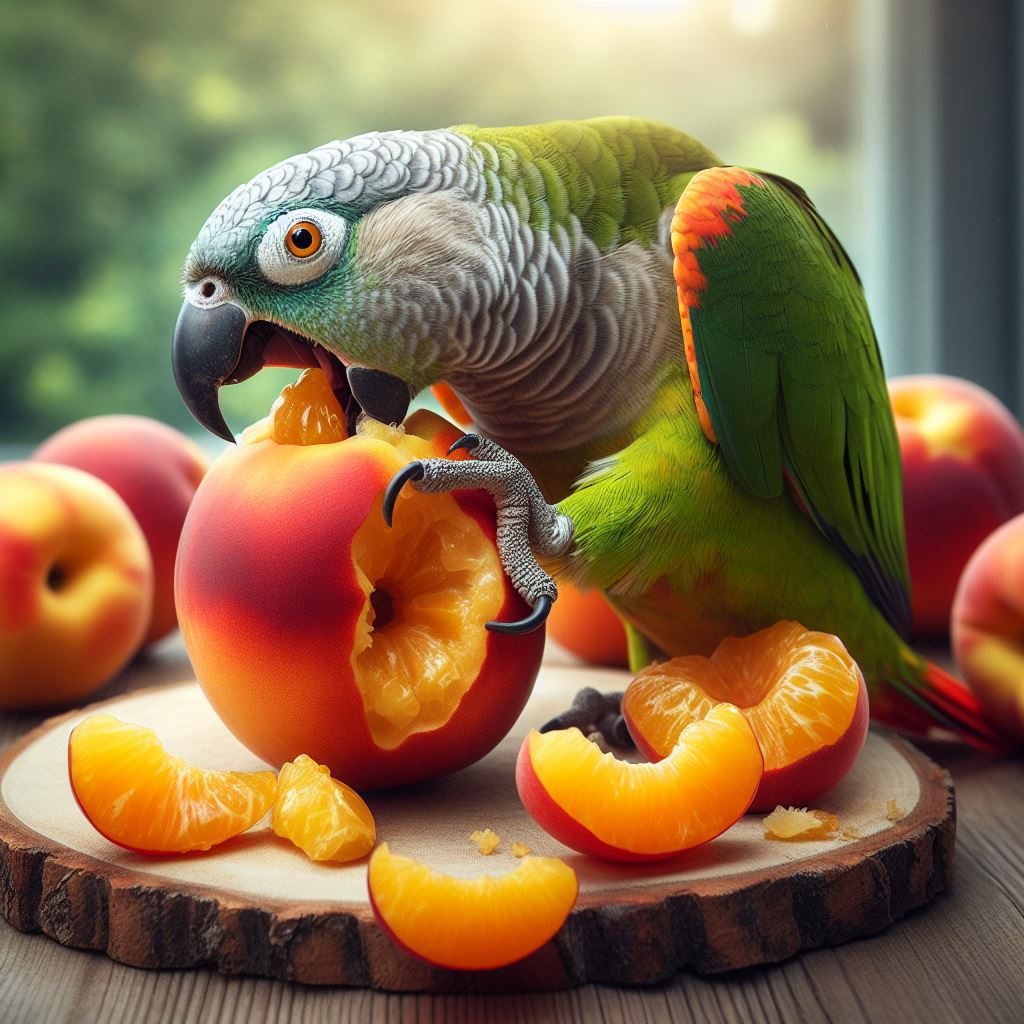As a parrot parent, it’s important to be aware of what goes into your bird’s diet as there are some foods you wouldn’t expect to be toxic to them, but are. The fact you’ve landed on this page means you care enough about your parrot to double-check if he can have a certain food before serving it up.
Nectarines are very similar to peaches, you can tell the difference between a nectarine and a peach as peaches have a more fuzzy skin to them whereas nectarines are a lot smoother. We know peaches are safe for our parrots to eat but what about nectarines? Let’s find out.

Can parrots eat nectarines? Yes, parrots can eat nectarines however before serving them to your parrot it’s important to remove the pit and seeds of the nectarine as they contain cyanide which is poisonous to eat, even for humans. With the danger out of the way, nectarines are a great source of copper, potassium, vitamin C, and B3 and contain antioxidants.
Read on as I’m going to further explain the benefits, how to remove the pit, and other things you should be aware of before you feed them to your parrot.
Nectarine Benefits For Parrots
We know nectarine is good for our Parrots, but just how good is it? Let’s take a closer look at the nutritional content.
One medium-sized nectarine (142 grams) contains :
| Calories | 63 |
| Protein | 1.5g |
| Sugar | 11.2g |
| Carbs | 15g |
| Fat | 0.5g |
| Fiber | 2.4g |
Copper
Nectarines contain copper, an important nutrient that has many purposes in your parrot’s body. It works with iron for the creation of red blood cells.
Other notable health benefits of copper include :
- Boosts immune system function
- Needed to maintain healthy bones, nerves, and blood vessels
- Improved cardiovascular health
- Collagen production
Kale, spinach, nuts, seeds, and beans all contain some copper if you need some examples to add to your parrot’s diet other than nectarines.
Potassium
Also found in nectarines is potassium, a mineral that your parrot’s body needs to function properly.
Here’s a list of them :
- Helps their muscles contract
- Keeps a steady heart rhythm
- Regulates blood pressure
- Improved digestive system
Other sources of potassium include peas, cucumber, spinach, broccoli, bananas, oranges, and cantaloupe are all great alternatives to give your parrot that much-needed potassium.
Vitamin B3
Vitamin B3 is one of 8 B vitamins that helps convert food into energy through the use of enzymes.
The health advantages vitamin B3 can bring to your parrot include :
- Reduces levels of bad cholesterol
- Can reduce blood pressure
- Improved skin health
- Boosts brain health and function
If your parrot is deficient in vitamin B6 it may experience fatigue, vomiting, loss of appetite, or even depression.
Green peas, potatoes, lentils, seats, and meat are all great sources of vitamin B3.
Vitamin C
Parrots need vitamin C in their diet as it helps with a number of functions that go on inside their little feathered bodies. Luckily there is some in nectarines. One of vitamin C’s main functions is to boost and protect the immune system to prevent illness or disease.
Important health benefits of vitamin C include :
- Acts as an antioxidant to keep cells healthy and free from disease
- Lowers blood pressure
- Increased cardiovascular health due to it cleaning plaque from blood vessels
- Cleans heavy metals out of the body
- Anti-inflammatory
- Helps with eye health
Red and green peppers, brussels sprouts, kiwi, broccoli, and watermelon all contain a healthy amount of vitamin C your parrot can benefit from.
A Source Of Antioxidants
In the body there are things called free radicals – they are unstable atoms that attack your parrot cells and can cause illnesses like cancer or heart disease. Well, think of antioxidants as the opposite of free radicals as they neutralize them and prevent any harm.
How You Should Feed Nectarine To Your Parrot
As we covered in the introduction you need to remove the pit and seeds before you can feed them to your parrot. Removing them is simple but you want to be gentle to prevent bruising the fruit or squashing it.
Step 1: Slice into the stem end of the fruit with a sharp knife until you reach the pit. Rotate the peach around the paring knife to cut the fruit into two halves all the way around the pit.
Step 2: Place your knife on the table. In each hand, take one half of the fruit and gently twist the halves in opposite directions. The pit will remain in one of the halves once the halves separate. (Some nectarines’ pits are exceptionally sticky, making it difficult to separate the fruit into two halves.) If this is the case, split the nectarines into smaller portions as you go, cutting away from the pit.
Step 3: To remove the pit from the fruit, use your paring knife to loosen the top and bottom. You can normally remove the pit from peaches at this time with your thumb and forefinger. To remove the pit from the nectarines, pull it out with the tip of the knife.
Voila, you now have a completely safe fruit to give to your parrot!
From here you should slice the nectarine into little slices for some portion control to prevent your bird from eating the whole thing.
What Other Foods Can Your Parrot Eat?
You know nectarines are safe for your Parrot to eat but if you’re like me then you’re always looking for new foods to improve your Parrot diet to create some variety and and include vital things that aren’t already in your bird’s diet.
So what other foods can your Parrot eat?
- Fruit & Vegetables
Foods like asparagus, broccoli, carrots, peppers, bananas, blueberries, and pineapples are all fine and encouraged for your Parrot to eat.
- Nuts
Things like almonds, Brazil nuts, cashews, hazelnuts, pistachios, and walnuts can be fed to your parrot. Just be wary of the fat content in some of them so they may need to be treated as a snack for your Parrot. We don’t want them getting fat!
Nectarine For Parrots – Final Thoughts
Similar to mangoes, nectarines are also a safe and nutritious fruit you can give to your parrot. Just remember you need to remove the pit and seeds as they contain cyanide that will poison your little feathered friend. Once the pit is removed they can enjoy all the benefits nectarines will bring to them.
I hope you have found this article helpful and your parrot enjoys a new delicious snack!






